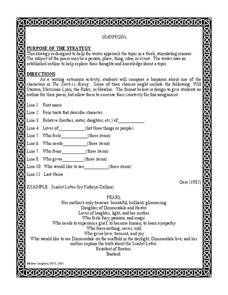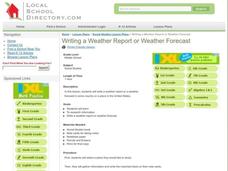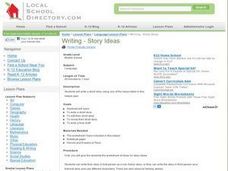Middle School Fantasy Teacher Resources
Find Middle School Fantasy lesson plans and worksheets
Showing 23 resources
Novelinks
The Dark Is Rising: Biopoem
How well do your learners really know the characters in Susan Cooper's The Dark is Rising? A biopoem activity prompts readers to investigate the characters and their traits. Line by line, writers add the characters' relatives,...
Curated OER
Reading Comprehension: Jack and the Giant Pepper
In this reading comprehension instructional activity, students first read a fantasy story called Jack and the Giant Pepper. Students then answer 22 essay questions about the text.
Curated OER
Fantasy Creature
Middle schoolers, in groups, create three-dimensional sculptures from found objects. They paint their sculptures and write essays that reflect on the collaborative creative project.
Curated OER
Writing a Fantasy Story - Time Travel
Students write a fantasy story about travelling back in time to the period of the Oregon Trail. They conduct research and take notes about the Oregon Trail, and write a first and a final draft of their short story about their visit to...
Curated OER
Hand-scapes
Students draw hands from life. They combine realistic hand drawing in fantasy "scape". They utilize elements of design demonstrating composition and value shading.
Curated OER
Venetian Carnival Masks
Pupils investigate the history of the Venetian Carnival and the use of the carnival masks in French and Italian traditions. Masks are then created noting the emphasis non fantasy, stylization, and abstraction features.
Curated OER
In Search of Ethnic Identity in Selected Narratives: New Reading, New Meaning
Students read texts reflecting multiple cultural perspectives.
Curated OER
Behind Closed Doors
Students explore different types of doors from an artistic point of view. In this creative thinking lesson, students look at different types of architectural doors and doorways and analyze them. They create a project of a door as a...
Curated OER
Creatures that Are Just So
Fourth graders listen to Rudyard Kipling's Just So stories read aloud. After observing an animal, 4th graders create their own "Just So" stories and publish them on Beacon's SiteMaker.
Curated OER
Surreal Hands
Students compare and contrast various forms of artistic expression. They examine the similarities and differences of how various artists worked.
Curated OER
Wire Sculpture
Learners see how to use tools to bend and twist wire in creating a contour line wire sculpture. After a lecture/demo, student practice the art of wire sculpture.
Curated OER
ARTQUARIUM
Students identify different underwater creatures, explain the importance of recycling in the community, plan preliminary sketches on paper, and construct and sculpt with chosen materials to create creature in paper mache.
Curated OER
A New Approach to Developing Images on Clay
Learners make story telling plates or tiles based on David Stabely's technique. They are shown slides of original work contemporary artists who are using nontraditional approaches to the clay surface. Students are shown work that David...
Curated OER
Writing a Weather Report or Weather Forecast
Students examine their geography skills. In this weather forecasting lesson plan, students select a location and research it. Students write a weather report or forecast for the chosen location based on their research.
Curated OER
Elegant Art Nouveau
Students create an elegant drawing in the ornamental, decorative and luxurious style of Klimt. After viewing a Powerpoint presentation, students create several patterns on scratchboards.
Curated OER
Students Get Animated: Make Existing Lessons Move and Motivate Students
Students study the chemical elements in a computer generated cartoon format. In this computer animation and chemistry lesson, students learn how to animate using computer programs. Students use animation to learn about the Periodic Table...
Curated OER
Your Future Occupation
Young scholars write a story about themselves as the main character in a work situation. In this writing perspectives lesson, students brainstorm about their future occupation. Young scholars then use themselves as the main character...
Curated OER
Drawing -Scratchboard
Students choose subject of composition and do sketches in computer lab of flora and fauna contained within their environment.
Curated OER
Writing a Tall Tale
Students study the various aspects of tall tales. They read various tall tales and discuss the characteristics and literature aspects of tall tales. Students write their own unique tall tales.
Curated OER
DRAWING AND DESIGN
Students use imagination to draw his/her locker. They develop measuring and estimation skills.
Curated OER
Writing - Story Ideas
Middle schoolers write their story in first person as a non-fiction story, or they can write the story in third person as a fictional story and use different characters. They can choose an idea from one of the story starters provided.
Curated OER
Homeschooling Chronicles - The Art of Studying
Learning study skills takes practice and patience.
Curated OER
Once a fact, always a truth
High schoolers discover there are many sources of accurate and inaccurate information. They use newspapers and, in small groups, develop a statement explaining why they believe the article is accurate or inaccurate.
























